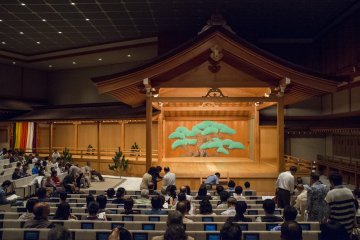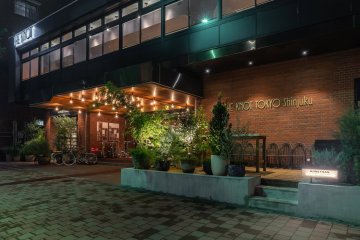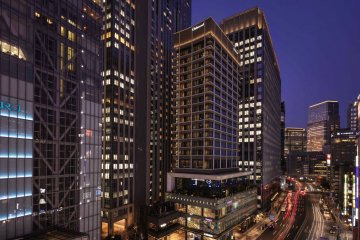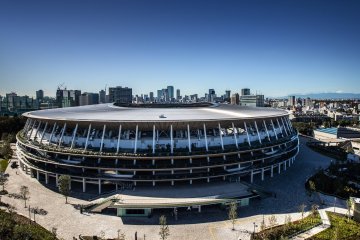
A Day at the National Noh Theater
Jerome LeeThe National Noh Theater is a 5 minute walk from Sendagaya Station on the JR Sobu Line, and is where traditional Noh and Kyogen plays are performed.

The National Noh Theater is located in Shibuya City, a mere three minutes walk from Shinjuku Gyoen National Garden. Opened in 1983, the facility is run by the Japan Arts Council and hosts various noh, kyogen, kabuki, and bunraku performances throughout the year.
The nearly 600-seat theater is composed primarily of wood and features an elegant 400-year-old cypress stage with a pine tree painted on the back, which is customary for noh stages. The facility also includes a rehearsal stage, lecture room, and reference library, as well as an exhibition area called the Traditional Performing Arts Information Centre. This center is located on the first floor and displays costumes, props, and ukiyo-e woodblock prints. It is free to enter and is open from 10:00–18:00.
You can purchase tickets online, reserve them by phone, or buy them at the theater.
Noh is a traditional form of Japanese theater that uses music, dance, gestures, masks, and elaborate costumes to tell a story that is often related to legends and history. Kyogen, on the other hand, is a comedic performance that relies on witty dialogue to make the audience laugh. The combination of the two, in which kyogen is performed during breaks in the noh performance, is called nogaku and is recognized as an UNESCO Intangible Cultural Property. Kabuki is another form of traditional theater that utilizes song and dance for storytelling, and bunraku is a type of Japanese puppet theater.
The theatre is a 5-minute walk from Sendagaya station on the JR Chuo or Sobu lines, or Kokuritsu-Kyogjjo station's A4 Exit on the Toei Oedo Line. From Kita-Sando station's Exit 1 on the Fukutoshin Line, it's a 7-minute walk.

The National Noh Theater is a 5 minute walk from Sendagaya Station on the JR Sobu Line, and is where traditional Noh and Kyogen plays are performed.

Seeing a Noh play at the National Noh Theatre in Tokyo is easy. Tickets can be bought at the box office or online. A free NTJ membership is required to purchase them online. This article explains how.

Have you ever been to or considered to go to a japanese event in ancient japanese language and felt lost or gave up trying to understand the turning of events ? This new approach using special lenses might completely change the way we enjoy this art.

The National Noh Theatre near Shibuya in central Tokyo is holding a free exhibition of historical noh theatre artefacts once belonging to the powerful Yamauchi Clan. The exhibition runs from 30th August to 4th November, 2018.

On May 14th, the National Noh Theatre will host dissemination performances of the kyogen play, Fuji Matsu and the noh play, Kosode Soga. Tickets start from JPY3,000.

Located right next to Shinjuku Chuo Park, THE KNOT TOKYO Shinjuku is a modern hotel with an exceptional design and easy access to the nearby Shinjuku train station and the Meiji Shrine. The 14-story hotel building was renovated and reopened in August 2018 as THE KNOT TOKYO Shinjuku . The western-style rooms offer a park view on the top floor as well as a newly opened terrace suite. The spacious atrium design offers a relaxed atmosphere and connects the restaurant, bar, lounge and lobby with one another. One of the highlights of THE KNOT is the delicious dishes. There are six areas in which food and drinks are offered. From the grill area to high-quality black tea and fresh bread, everything is on offer.

Oakwood Premier Tokyo comes from a brand of standout luxury hotel & service apartments right at the heart of the Tokyo metropolis. It is located in the business hub of Marunouchi with JR Tokyo Station in close proximity. This will allow guests and travelers to easily access the city's extensive transport network and visit various landmarks such as Imperial Palace, Tsukiji Fish Market, Ginza and Shopping District. Boasting 123 luxurious apartments on the upper floors of a multi-serviced complex, each room offers a magnificent view of the city, not to mention all furnished and a fully-equipped kitchen set which is rarely seen in your everyday service apartment. Without doubt, these spacious tranquil retreats are curated to give you the amenities and services of a luxury hotel and a feeling of home. They are good options for both business executives and leisure travelers from one night of a short-stay to a few weeks/months of mid-to-long-term stay.

With Koenji being a "creative town" it's no surprise that the BnA Hotel opened there in 2016 and has had, subsequently, an incredible impact on the local community. BnA (Bed and Art) has other spaces dotted about Tokyo and Kyoto, but the Koenji edition is possibly more immersive as the concept is "stay in an artwork." In collaboration with local artists, the BnA has created an impressive multi-storey art experiment for art lovers and creatives with a desire to inhabit art. The first floor acts as a front desk and bar which comes alive at night with events and selected DJs. It also hosts Masu Masu onigiri cafe with artists being asked to come and exchange artwork with each other in a gesture which reflects the true spirit of Koenji. With two "living art" twin rooms taking up the second and third floors designed by a seasonal rotation of local artists, guests can engage with and inhabit their art rooms. BnA Koenji also plays host to a rooftop lounge and a basement space which is used for artists residencies where their work is shown to the public and a DJ booth and streaming equipment for live performances. With live painting events and an eclectic variety of regular events, the BnA Hotel becomes, itself, a living canvas. The BnA believes that it's a machigata hotel, meaning that guests should (and are encouraged) to interact with Koenji. Use the public sentos, eat in the local restaurants that surround the hotel and buy locally from the multitude of shops, market stalls, bars and cafes which make-up the fabric of Koenji. Feted by international press such as The Guardian, BnA acts as a creative network with the concept of serendipity being discussed as the bar becomes an ad hoc meeting place where collaborations and friendships between artists and locals are born. The BnA was also instrumental in a street art festival named MCP (Mural City Project) which was supported by Suginami Ward. MCP was incredibly ambitious and truly communal with the desire to transform and coalesce the community through the creation of public murals. The BnA, Koenji and Suginami spearheaded a public art movement which should be commended and replicated throughout Tokyo.

Mame Shiba Cafe offers a unique experience where you can interact with Shiba dogs while enjoying your favorite drinks. You cannot make reservations in advance through phone or online, so it is best to book early in the morning at a store. The cafe requires customers to make a reservation in-store, present their receipt at the reserved time, and then enter the cafe.

B-Flat Commune is an open-air hangout in Omotesandō featuring a variety of stalls and food trucks offering unique drinks, clothing, and bites to eat. Its relaxed vibe and plenty of seating make it an ideal spot for casual meetups and spending time with friends. It's a creative place where people can gather to eat a the open-air dining space or purchase fashion, antiques, product goods and other lifestyle items. Events are sometimes hosted at this community space, and operating stores may change from month to month.

If you're a fan of Quentin Tarantino’s Kill Bill, there's one Tokyo restaurant that absolutely deserves a spot on your bucket list. While you may not know it by its real name, chances are you've seen it on screen—it’s the unforgettable setting for the iconic, over-the-top showdown between The Bride and the Crazy 88. Known affectionately by fans as “The Kill Bill Restaurant,” this venue offers more than just cinematic nostalgia—it's a vibrant and unique dining experience in its own right. Located in Tokyo’s upscale Nishi-Azabu district, this classic-style izakaya bar is where fiction meets flavor. Though the fake blood and samurai swords have long been cleaned away, the spirit of the film lives on in the architecture and atmosphere. Stepping inside feels like walking onto the set: a grand, high-ceilinged hall with a central open-plan dining space, surrounded by a mezzanine-level balcony—instantly recognizable to anyone who’s watched the movie. But don’t mistake it for just a movie-themed attraction. The Kill Bill restaurant is a serious culinary destination. It offers a wide variety of traditional Japanese dishes, from sashimi and grilled skewers to noodle dishes and seasonal specialties. The menu also boasts creative fusion items like avocado and camembert tempura, which nods to the restaurant’s global popularity and mindset. And for international travelers with specific dietary needs, the restaurant provides vegan and halal-friendly menus (with at least three days’ notice). What makes this spot truly special is its ability to deliver a top-tier gourmet experience while doubling as a pop culture pilgrimage. You can sip sake where Uma Thurman once sliced through waves of enemies—minus the chaos, of course. Whether you’re a die-hard Tarantino fan, a foodie on the hunt for authentic Japanese flavors, or simply someone looking for a unique night out in Tokyo, this restaurant checks every box. Just one tip: Enjoy the drinks and dishes, but leave the swordplay to the professionals. Note: As you’d expect, Gonpachi is a popular restaurant. Same-day reservations are possible, but ideally you’ll want to reserve your table at least two days ahead of your visit, and even earlier if you’re planning to visit at the weekend.

The venue for the gymnastics and water polo competitions during the 1964 Tokyo Olympics, the Tokyo Metropolitan Gymnasium continues to be an important sporting facility for the city today. It will host the table tennis competition during the 2020 Olympic and Paralympic Games. The site has an interesting history. It was once owned by Iemasa Tokugawa (1884 to 1963), a politician and diplomat, and the 17th hereditary head of the famous Tokugawa shogunal family. The Tokyo government purchased the land and buildings in 1943, it was then used by US military officers for some years following the Second World War. After the site passed back into the hands of the Tokyo government in 1952, all the former wooden buildings were torn down and a modern concrete gymnasium was finished in 1956. The facility underwent a complete renovation between 1986 and 1990 and the city has continued to make additions and improvements over the years. The main arena can seat up to 10,000 people. The gymnasium has hosted both national and international sporting competitions in diverse sports, such as volleyball, wrestling, and figure skating. Since 2000, the arena has also been used for concerts and Katy Perry performed there in 2015. A new kind of system for managing the gymnasium was instigated by the Tokyo government in 2006, with Tokyo Sport Benefits Corporation being the current designated manager. Some of the facilities, including the swimming pool, training room, and athletic fields are usually open for use by the public. However, please note these are currently closed due to preparations for the 2020 Tokyo Olympic and Paralympic Games.

Shinjuku Gyoen is one of the largest and most popular public gardens in Tokyo. The park is just a short walk from the well-known Shinjuku district and is particularly famous for its seasonal cherry blossoms. Shinjuku Gyoen was created during the Edo period (1603-1867) as the residence of a feudal lord in Tokyo and was later converted into a botanical garden. In 1903 the area was transferred to the imperial family, who used it for recreation. The park was almost completely destroyed in World War II but was eventually rebuilt and reopened as a public park in 1949. There is a Japanese garden as well as French and English gardens and a greenhouse. There are also several spacious green areas where you can go for a walk and enjoy the cherry blossom or autumn leaves.

The National Stadium was used as the main stadium for the 1964 Tokyo Olympics and was then converted into a brand new stadium for the next Tokyo Olympics and Paralympic Games. It is located in Kasumigaoka, Shinjuku District, where the Olympic opening and closing ceremonies will be held and Paralympic Games, as well as athletics and football matches, after which the stadium will be used for sporting and cultural events.The stadium has a capacity of 68,089 seats. There is a park landscape with lots of trees around the stadium. The open facade is fitted with greenery all around and is intended to promote ventilation of the interior of the stadium. During the construction, attention was paid to the use of natural materials such as wood. This, which comes from 47 prefectures in the country, was also used for the roof construction, the facade, as well as for the changing rooms and boxes.